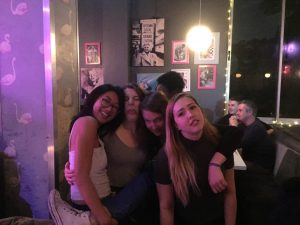Before I came to South Africa, I assumed that I would experience at least a few uncomfortable moments due to my race. I surmised that there weren’t many Asian South Africans, and that I’d probably be subject to a few curious stares and yells of “China!” or “Nihao!” from random passersby.
I was right.
But the yells and comments were more common than I’d imagined. I had traveled in Europe before, and had gotten those comments more often than I’d have liked, but somehow, it felt different in Stellenbosch. When I was in Europe, it was only for a few weeks of vacation — my experiences were much more removed from my everyday life, and the catcallers lived and worked at least an ocean away from me.
But in Stellenbosch, the comments were screamed at me when I walked by myself to meet friends at a restaurant downtown, when I was with friends at a club filled with Stellenbosch students, and when I was at the mall shopping for groceries. It was pervasive in my everyday life in a way it hadn’t been before — in the neighborhood I lived in, in my new university, and in the town I called home for a few months.
The worst incident occurred when my boyfriend was visiting from Johannesburg, where he had been completing an internship abroad. My boyfriend, who passes as white, had convinced me to watch the final football (soccer) match at a sports bar in Stellenbosch. The bar was filled with male Stellenbosch students — that is to say, white, blonde, mostly Afrikaaner Stellenbosch students. After the match finished, my boyfriend and I walked across the street to grab a burger at Steers.
Just after we finished ordering at the counter, a white, blonde Stellenbosch student approached my boyfriend and said hello in a pretty typical drunken way.
Then he asked my boyfriend if I was Korean.
When my boyfriend said “No,” he asked, “What’s her descent?” as if I were a racehorse or a dog, and my boyfriend the proud owner.
“I’m American,” I said too-loudly, angrily.
“It’s great to see you two together,” said the stranger, as if his random microaggressive comment could be absolved by his “encouragement” of a mixed-race couple.
We left as soon as we could, angry and shaken.
The crazy thing about all of this is that South Africa does have a significant history of Asian slaves and immigrants. Malay slaves, from current-day Southeast Asia, were brought to South Africa by Dutch colonizers. Chinese workers from Hong Kong were brought to Johannesburg by the thousands to work the mines. Indian and South Asian South Africans like Gandhi made an indelible mark in Johannesburg and Durban. Even during apartheid, Chinese and other Asian people were categorized as “Colored,” in between Black and White categorizations, and were given some sort of second-class designation.
But Asians in South Africa are still viewed as a foreign influence and are called out on their foreign-ness every day. Of course, this happens in the U.S. as well, where Asian American history is ignored or only briefly mentioned in class, if at all, and Asian Americans are portrayed as socially awkward nerds in TV shows and movies, if included at all. I had gotten used to American microaggressions, which are weaved into “polite” conversation with acquaintances about where I’m “really” from, but I wasn’t used to overt comments like the ones I experienced in South Africa.
At the same time, the microaggressions I experienced were mitigated by the fact that strangers probably thought I was a well-off Chinese or American tourist. Though the comments made me feel unsafe, my class and foreign status actually protected me from physical harm. Being Asian-American in South Africa has privilege attached to it, too.
In contrast, xenophobic violence in South Africa actually targets immigrants from Zimbabwe and Nigeria. Poor South Africans may feel that these immigrants are reaping benefits from the government that they are denied, resulting in violence against African immigrants in recent years.
If you’re not white and going on this trip…
Be prepared to feel uncomfortable — but also try to find at least one friend on the trip who you can be open to about your experiences. For me, it was cathartic to talk to my friends and feel heard whenever I experienced this kind of a situation. Find a support system.
At the same time, try to focus outside of yourself. As a quasi-tourist, you’re in a particular position that is mostly outside of the South African sociohistorical context. Try to understand the larger race relations issues that are at stake, and understand how your experience fits in with that.
You’re there to learn, and learning is not always comfortable. Be present, be honest with your emotions and soak in all you can.


I often what it’s like for Asians to go to SA. Thanks for sharing your experience.
Hey there, i enjoyed your article especially as a black South African. It has given me more insight to the struggles that Asian-Americans face regarding race and don’t worry regarding the racism issue at Stellebosch,as from my experience the issue of racism is very prevalent that side(I’m not stating that everyone that side is racist).
i hope to hear more from your experiences in South Africa
Warm Regards